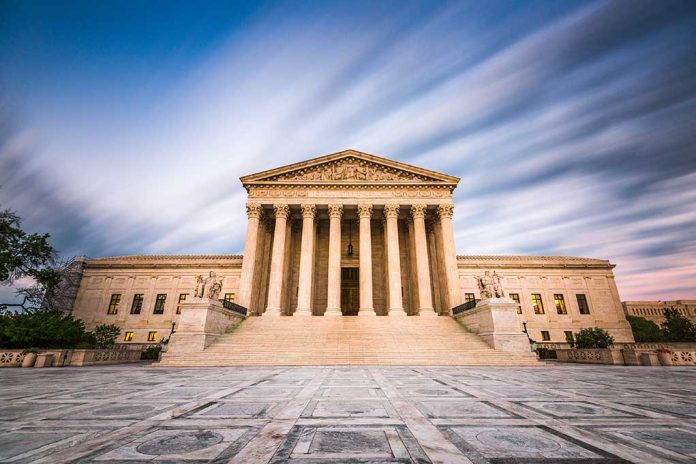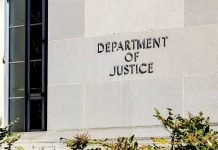
Nebraska’s Supreme Court upholds felon voting rights, sparking debate on civic engagement and public safety.
At a Glance
- Nebraska Supreme Court eliminates two-year waiting period for felons to vote after completing sentences
- Ruling comes just before voter registration deadline, potentially impacting upcoming election
- Decision orders Secretary of State to comply, overturning previous halt on felon voter registration
- Case highlights national debate over felon voting rights and their impact on elections
Court Strikes Down Waiting Period
In a landmark decision, the Nebraska Supreme Court has upheld a law allowing felons to register to vote immediately after completing their sentences. This ruling eliminates a previous two-year waiting period, potentially reshaping the state’s electoral landscape. The decision came just before Nebraska’s voter registration deadline for the upcoming general election, amplifying its significance.
The court’s ruling directly challenges efforts by some state officials to restrict ballot access. Nebraska Secretary of State Robert Evnen had previously halted the registration of former felons based on an opinion that the new law was unconstitutional. However, the Supreme Court’s decision now mandates compliance with the law, opening the door for immediate voter registration by those who have served their sentences.
Nebraska's Supreme Court upholds felon voting rights https://t.co/mfQUnSWd4D
— Axios (@axios) October 16, 2024
Impact on Upcoming Elections
The timing of this ruling is particularly crucial given the competitive races in Nebraska’s 2nd Congressional District. With a close U.S. House race, a tight U.S. Senate contest, and abortion measures on the ballot, the influx of newly eligible voters could potentially sway outcomes. While Nebraska traditionally leans Republican, the full impact of this decision on future elections remains to be seen.
This case exemplifies the ongoing struggle to define and protect voting rights across our nation. As we approach the 2024 election, the Nebraska Supreme Court’s decision could significantly influence voter participation and potentially impact similar cases nationwide.
Nebraska’s Supreme Court affirms felons' voting rights https://t.co/nXPKFnqnVy
— UPI.com (@UPI) October 16, 2024
Legal Battle and Constitutional Debate
The court’s decision follows a three-month legal battle concerning the voting rights of individuals with felony convictions. Attorney General Mike Hilgers and Secretary of State Bob Evnen had challenged the constitutionality of the new law, arguing that voting rights restoration is an executive power vested in the Nebraska Board of Pardons. This board, which includes Hilgers, Evnen, and Governor Jim Pillen, was argued to have sole jurisdiction over voting rights restoration.
However, the Nebraska Supreme Court, in a split opinion, rejected this view and ordered compliance with the new law. Two justices, Jeffrey Funke and John Freudenberg, dissented from the majority opinion, highlighting the contentious nature of the decision.
ICYMI: The Nebraska Supreme Court has upheld voting rights for felons once they have completed their sentences, a ruling made just weeks before the 2024 presidential election. https://t.co/eX4HfOF7WX
— 10/11 News (@1011_News) October 16, 2024
National Context and Implications
This ruling places Nebraska at the forefront of a national debate over felon voting rights. While most states have restrictions on voting for those convicted of felonies, with about two dozen maintaining limitations even after sentence completion, Nebraska’s decision represents a significant shift towards expanding civic participation.
The court’s decision, coming from a Republican-majority bench, underscores the complex nature of this issue that transcends traditional party lines. While not expected to significantly affect the presidential race outcome in the predominantly Republican state, it does raise important questions about redemption, civic engagement, and the balance between public safety and voting rights.
As the nation grapples with these fundamental questions of democracy and justice, Nebraska’s Supreme Court has taken a bold step in affirming the right of felons to participate in the democratic process immediately upon completing their sentences. The long-term implications of this decision will undoubtedly be a subject of continued debate and scrutiny in the years to come.
Sources:
- Nebraska law allowing felons to vote upheld by state court
- Nebraska Supreme Court clears the way for people with felony convictions to vote
- Nebraska Supreme Court: Nebraskans with felony convictions can ‘immediately’ register to vote
- Nebraska Supreme Court rules felons can vote after sentence completion









